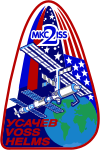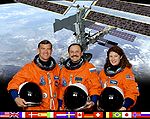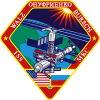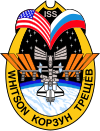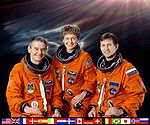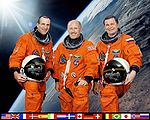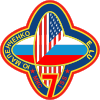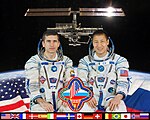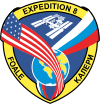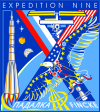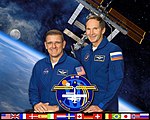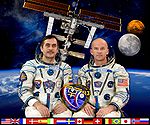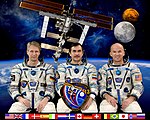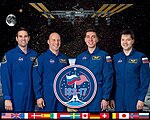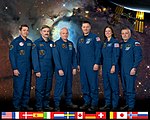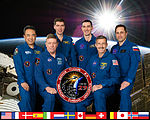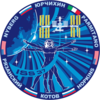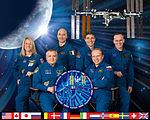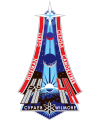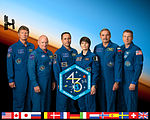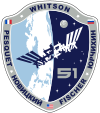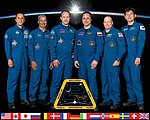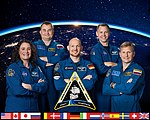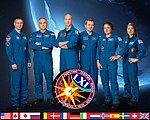List of ISS expeditions

This is the chronological list of the ISS expeditions , the long-term crews on the International Space Station .
Further details can be found in the list of ISS commanders , the list of manned ISS missions and the list of space travelers on the ISS . The latter two also list short-term visitors.
Explanations
The names of the ISS expeditions are followed by a list of the crew members. After the names of the members, the number of space flights they have taken is noted in brackets. The abbreviations CDR and BI that follow indicate the functions of the ISS commander and the flight engineers. The term “flight engineer” should not be confused with the function of the same name in aviation - every ISS expedition member who is not currently in the role of commander is called “flight engineer”.
The further structure of the list changes from Expedition 21/22:
- Successive expeditions up to expedition 20 overlap each other by one to two weeks. Therefore, the period of each expedition is given in full with the beginning, duration and end.
- All expeditions from No. 21 onwards go directly into one another; the end time of one expedition is identical to the start of the next. To save space and provide a better overview, only the duration and the end of each expedition are given from Expedition 22 onwards. In addition, the arrival times of the space travelers - which are no longer identical with the start of an expedition - are given separately from Expedition 21 onwards.
All dates refer to Coordinated Universal Time (UTC).
The typical length of stay for each crew member is around six months. Half of the available places go to space travelers from NASA and Roskosmos , with NASA passing on parts of its contingent to the international partners. As with other resources on the ISS, 12.8% go to JAXA , 8.3% to ESA and 2.3% to CSA .
Previous expeditions
Expeditions 1 to 6
The participants of the first expedition reached the station on November 2, 2000 with the Russian Soyuz spacecraft TM-31, which also served as a return vehicle in an emergency. On the following expeditions, the crew was exchanged while visiting an American space shuttle . The Soyuz capsule was replaced by three-person visiting missions. Since the replacement teams each arrived about a week before the planned return of the previous crew, the expeditions overlapped around this period.
| emblem | Team photo | Members | Beginning | Duration | The End | ||
|---|---|---|---|---|---|---|---|
| ISS expedition 1 | |||||||
|
|
Nov. 2, 2000 docking with Soyuz TM-31 |
136.8 days |
19 Mar 2001 Decoupling of STS-102 |
||||
| ISS expedition 2 | |||||||
|
|
10 Mar 2001 coupling of STS-102 |
163.3 days |
Aug. 20, 2001 Decoupling of STS-105 |
||||
| ISS expedition 3 | |||||||
|
|
Aug. 12, 2001 coupling STS-105 |
124.9 days |
Dec. 15, 2001 Decoupling of STS-108 |
||||
| ISS expedition 4 | |||||||
|
|
7th Dec. 2001 coupling STS-108 |
189.8 days |
June 15, 2002 Decoupling of STS-111 |
||||
| ISS expedition 5 | |||||||
|
|
June 7, 2002 coupling STS-111 |
178.2 days |
Dec. 2, 2002 Decoupling of STS-113 |
||||
| ISS expedition 6 | |||||||
|
|
Nov. 25, 2002 Coupling STS-113 |
159.0 days |
May 3, 2003 Soyuz TMA-1 decoupling |
||||
Expeditions 7 to 12
The space shuttle Columbia crashed on February 1, 2003. As a result, further flights of the space shuttle fleet were canceled until July 2005. From Expedition 7 onwards, the crew was therefore exchanged using the Soyuz capsules. In order to guarantee the supply even without shuttle flights, the team strength of the expeditions was reduced from three to two members.
The expeditions began with the docking of the feeder spaceship and ended with its decoupling for the return flight. Since the replacement team arrived about a week before the planned return of the previous crew, the expeditions overlapped around this period.
| emblem | Team photo | Members | Beginning | Duration | The End | ||
|---|---|---|---|---|---|---|---|
| ISS expedition 7 | |||||||
|
|
Apr. 28, 2003 Soyuz TMA-2 docking |
182.7 days |
Oct. 27, 2003 Soyuz TMA-2 decoupling |
||||
| ISS expedition 8 | |||||||
|
|
Oct. 20, 2003 Soyuz TMA-3 docking |
192.6 days |
Apr. 29, 2004 Soyuz TMA-3 decoupling |
||||
| ISS expedition 9 | |||||||
|
|
Apr. 21, 2004 Docking Soyuz TMA-4 |
185.7 days |
Oct. 23, 2004 Soyuz TMA-4 decoupling |
||||
| ISS expedition 10 | |||||||
|
|
October 16, 2004 Soyuz TMA-5 docking |
190.6 days |
Apr. 24, 2005 Soyuz TMA-5 decoupling |
||||
| ISS expedition 11 | |||||||
|
|
Apr 17, 2005 Soyuz TMA-6 docking |
176.8 days |
October 10, 2005 Soyuz TMA-6 decoupling |
||||
| ISS expedition 12 | |||||||
|
|
Oct. 3, 2005 Soyuz TMA-7 docking |
187.6 days |
Apr 8, 2006 Soyuz TMA-7 decoupling |
||||
Expeditions 13 to 19
On July 26, 2005, the Discovery launched a space shuttle for the first time since the Columbia crashed. Almost a year later, on July 4, 2006, the Discovery brought ESA astronaut Thomas Reiter to the ISS, increasing the permanent crew to three members. The commander and the first flight engineer continued to be exchanged with the Soyuz spaceships, while the second flight engineer was exchanged for the shuttle missions that are now regularly starting again.
The expedition periods continued to correspond to the periods of presence of the Soyuz crews, while the shuttle astronauts arrived on interim dates and sometimes took part in two expeditions. (The data of the expeditions are shown below in black font, the independent data of the shuttle flights in gray .)
| emblem | Team photo | Members | Beginning | Duration | The End | ||
|---|---|---|---|---|---|---|---|
| ISS expedition 13 | |||||||
|
|
Apr. 1, 2006 Soyuz TMA-8 docking |
180.7 days |
28 Sep 2006 Soyuz TMA-8 decoupling |
||||
|
|
July 6, 2006 docking with STS-121 |
166.3 days |
Dec. 19, 2006 Decoupling STS-116 |
||||
| ISS expedition 14 | |||||||
|
|
Sep 20 2006 coupling of Soyuz TMA-9 |
213.2 days |
Apr. 21, 2007 Soyuz TMA-9 decoupling |
||||
|
|
Dec. 11, 2006 docking with STS-116 |
189.7 days |
June 19, 2007 Decoupling of STS-117 |
||||
| ISS expedition 15 | |||||||
|
|
Apr. 9, 2007 coupling Soyuz TMA-10 |
194.5 days |
Oct. 21, 2007 Soyuz TMA-10 decoupling |
||||
|
|
June 10, 2007 coupling STS-117 |
147.6 days |
Nov. 5, 2007 Decoupling of STS-120 |
||||
| ISS expedition 16 | |||||||
|
|
Oct. 12, 2007 docking with Soyuz TMA-11 |
189.6 days |
Apr 19, 2008 Soyuz TMA-11 decoupling |
||||
|
|
Oct. 25, 2007 coupling STS-120 |
115.9 days |
Feb. 18, 2008 Decoupling of STS-122 |
||||
|
|
Feb. 9, 2008 coupling STS-122 |
44.3 days |
25th Mar 2008 Decoupling of STS-123 |
||||
|
|
13 Mar 2008 coupling of STS-123 |
90.3 days |
June 11, 2008 Decoupling of STS-124 |
||||
| ISS expedition 17 | |||||||
|
|
Apr 10, 2008 docking with Soyuz TMA-12 |
196.5 days |
Oct. 24, 2008 Soyuz TMA-12 decoupling |
||||
|
|
June 2, 2008 coupling STS-124 |
178.9 days |
Nov 28, 2008 Decoupling of STS-126 |
||||
| ISS expedition 18 | |||||||
|
|
Oct. 14, 2008 Docking Soyuz TMA-13 |
175.8 days |
Apr 8, 2009 Soyuz TMA-13 decoupling |
||||
|
|
Nov. 16, 2008 coupling STS-126 |
128.9 days |
25th Mar 2009 Decoupling of STS-119 |
||||
|
|
17th Mar 2009 coupling of STS-119 |
132.8 days |
July 28, 2009 Decoupling STS-127 |
||||
| ISS expedition 19 | |||||||
|
|
28 Mar 2009 Soyuz TMA-14 coupling |
62.0 days |
May 29, 2009 Docking Soyuz TMA-15 |
||||
Expeditions 20 and 21
Since May 2009, the ISS crew has normally consisted of six people. Correspondingly, two Soyuz capsules are always coupled as return vehicles. Three crew members are replaced every two or four months. The command then passes to one of the remaining spacemen and the numbering changes. Each crew member belongs to two expeditions. Most of the crew will be transported by Soyuz spaceships, but some will continue to be exchanged during shuttle missions.
From expedition 20 onwards, the expedition periods no longer overlap; instead, the decoupling of a Soyuz spaceship marks the transition to the next expedition. Expedition 20 began for the last time with the coupling of a Soyuz capsule. (The arrival dates of the space travelers are therefore given separately from Expedition 21; they can no longer be read from the expedition periods.)
| emblem | Team photo | Members | Beginning | Duration | The End | |||
|---|---|---|---|---|---|---|---|---|
| ISS expedition 20 |
|
|
||||||

|
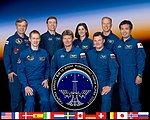
|
|
May 29, 2009 Docking Soyuz TMA-15 |
134.5 days |
Oct. 11, 2009 Soyuz TMA-14 decoupling |
|||
|
|
July 17, 2009 docking with STS-127 |
53.1 days |
8 Sep 2009 Decoupling of STS-128 |
|||||
|
|
Aug. 31, 2009 coupling STS-128 |
86.4 days |
Nov 25, 2009 Decoupling of STS-129 |
|||||
| ISS expedition 21 | ||||||||
|
Arrival Oct. 2, 2009 with Soyuz TMA-16
|
Oct. 11, 2009 Soyuz TMA-14 decoupling |
51.1 days |
Dec. 1, 2009 Soyuz TMA-15 decoupling |
|||||
Expeditions 22 to 42
With the end of the space shuttle program in 2011, long-term crews will be exchanged exclusively via the Russian Soyuz spaceships until further notice.
Since No. 21, the expeditions no longer begin with the arrival of new spacemen, but with the end of the previous expedition. The arrival times of the participants are therefore no longer evident from the expedition data and are mentioned separately in the list. The length of stay of the space travelers can be found in the Soyuz Articles or the list of manned missions to the International Space Station ; it no longer corresponds to the duration of the expeditions.
| emblem | Team photo | Members | Duration | The End | |
|---|---|---|---|---|---|
| ISS expedition 22 |
|
||||
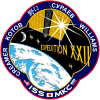
|

|
from Dec. 22, 2009 - Soyuz TMA-17
|
107.2 days |
18 Mar 2010 Soyuz TMA-16 decoupling |
|
| ISS expedition 23 | |||||
|
from April 4, 2010 - Soyuz TMA-18
|
75.7 days |
June 2, 2010 Soyuz TMA-17 decoupling |
|||
| ISS expedition 24 | |||||

|
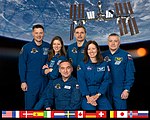
|
from June 17, 2010 - Soyuz TMA-19
|
115.1 days |
25 Sep 2010 Soyuz TMA-18 decoupling |
|
| ISS expedition 25 | |||||
|
from Oct. 10, 2010 - Soyuz TMA-01M
|
62.0 days |
Nov 26, 2010 Soyuz TMA-19 decoupling |
|||
| ISS expedition 26 | |||||

|
from Dec. 17, 2010 - Soyuz TMA-20
|
110.1 days |
16. Mar. 2011 Soyuz TMA-01M decoupling |
||
| ISS expedition 27 | |||||
|
from April 6, 2011 - Soyuz TMA-21
|
68.7 days |
May 23, 2011 Soyuz TMA-20 decoupling |
|||
| ISS expedition 28 | |||||
|
from June 9, 2011 - Soyuz TMA-02M
|
115.1 days |
17 Sep 2011 Soyuz TMA-21 decoupling |
|||
| ISS expedition 29 | |||||
|
from Nov. 16, 2011 - Soyuz TMA-22
|
66.9 days |
Nov 21, 2011 Soyuz TMA-02M decoupling |
|||
| ISS expedition 30 | |||||

|
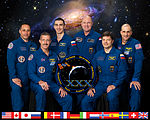
|
from 23rd Dec. 2011 - Soyuz TMA-03M
|
157.4 days |
Apr. 27, 2012 Soyuz TMA-22 decoupling |
|
| ISS expedition 31 | |||||
|
from May 17, 2012 - Soyuz TMA-04M
|
64.9 days |
July 1, 2012 Soyuz TMA-03M decoupling |
|||
| ISS expedition 32 | |||||
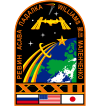
|

|
from July 17, 2012 - Soyuz TMA-05M
|
77.8 days |
16 Sep 2012 Soyuz TMA-04M decoupling |
|
| ISS expedition 33 | |||||
|
from Oct 25, 2012 - Soyuz TMA-06M
|
63.0 days |
Nov. 18, 2012 Soyuz TMA-05M decoupling |
|||
| ISS expedition 34 | |||||

|

|
from Dec. 21, 2012 - Soyuz TMA-07M
|
117.1 days |
15th Mar 2013 Soyuz TMA-06M decoupling |
|
| ISS expedition 35 | |||||
|
from March 29, 2013 - Soyuz TMA-08M
|
59.0 days |
May 13, 2013 Soyuz TMA-07M decoupling |
|||
| ISS expedition 36 | |||||
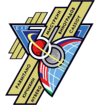
|
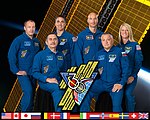
|
from May 29, 2013 - Soyuz TMA-09M
|
120.0 days |
Sep 10 2013 Soyuz TMA-08M decoupling |
|
| ISS expedition 37 | |||||
|
from 26 Sep 2013 - Soyuz TMA-10M
|
61.0 days |
Nov 10, 2013 Soyuz TMA-09M decoupling |
|||
| ISS expedition 38 |
from Nov. 7, 2013 - Soyuz TMA-11M
|
||||

|
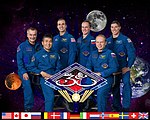
|
120.0 days |
11th Mar 2014 Soyuz TMA-10M decoupling |
||
| ISS expedition 39 | |||||
|
from March 27, 2014 - Soyuz TMA-12M
|
63.9 days |
May 13, 2014 Soyuz TMA-11M decoupling |
|||
| ISS expedition 40 | |||||

|

|
from May 29, 2014 - Soyuz TMA-13M
|
120.0 days |
Sep 10 2014 Soyuz TMA-12M decoupling |
|
| ISS expedition 41 | |||||
|
from 26 Sep 2014 - Soyuz TMA-14M
|
60.1 days |
Nov 10, 2014 Soyuz TMA-13M decoupling |
|||
| ISS expedition 42 | |||||

|

|
from Nov. 24, 2014 - Soyuz TMA-15M
|
121.9 days |
11th Mar 2015 Soyuz TMA-14M decoupling |
|
Expeditions 43 to 46 (with annual mission)
As a one-off experiment as part of the NASA Twins Study , Michail Kornijenko and Scott Kelly's time was extended from six to twelve months. This left two places available for short-term stays, which were filled by the Dane Andreas Mogensen and the Kazakhs Aidyn Aimbetow .
| emblem | Team photo | Members | Duration | The End | ||
|---|---|---|---|---|---|---|
| ISS expedition 43 |
|
|||||
|
from March 28, 2015 - Soyuz TMA-16M
|
91.4 days |
June 11, 2015 Soyuz TMA-15M decoupling |
||||
|
|
|
|||||
| ISS expedition 44 | ||||||

|

|
from July 23, 2015 - Soyuz TMA-17M
|
90.5 days |
Sep 11 2015 Soyuz TMA-16M decoupling |
||
| ISS expedition 45 |
from Sept. 4, 2015 - Soyuz TMA-18M
|
|||||
| 91.5 days |
Dec. 11, 2015 Soyuz TMA-17M decoupling |
|||||
| ISS Expedition 46 | ||||||

|
from Dec. 15, 2015 - Soyuz TMA-19M
|
81.6 days |
2nd Mar 2016 Soyuz TMA-18M decoupling |
|||
Expeditions 47 to 58
| emblem | Team photo | Members | Duration | The End | ||
|---|---|---|---|---|---|---|
| ISS expedition 47 |
|
|||||
|
from March 19, 2016 - Soyuz TMA-20
|
108.4 days |
June 18, 2016 Soyuz TMA-19M decoupling |
||||
| ISS expedition 48 | ||||||
|
from July 9, 2016 - Soyuz MS-01
|
80.7 days |
6 Sep 2016 Soyuz TMA-20M decoupling |
||||
| ISS expedition 49 | ||||||
|
from Oct. 21, 2016 - Soyuz MS-02
|
53.1 days |
Oct. 30, 2016 Soyuz MS-01 decoupling |
||||
| ISS expedition 50 | ||||||
|
from Nov. 19, 2016 - Soyuz MS-03
|
162.3 days |
Apr 10, 2017 Soyuz MS-02 decoupling |
||||
| ISS expedition 51 | ||||||
|
from April 20, 2017 - Soyuz MS-04
|
53.1 days |
June 2, 2017 Soyuz MS-03 decoupling without Whitson |
||||
| ISS expedition 52 |
from July 28, 2017 - Soyuz MS-05
|
|||||
| 92.4 days |
Sep 2 2017 Soyuz MS-04 decoupling from Whitson |
|||||
| ISS expedition 53 | ||||||
|
from Sep 13 2017 - Soyuz MS-06
|
102.3 days |
Dec. 14, 2017 Soyuz MS-05 decoupling |
||||
| ISS expedition 54 | ||||||
|
from Dec. 19, 2017 - Soyuz MS-07
|
75.4 days |
Feb. 27, 2018 Soyuz MS-06 decoupling |
||||
| ISS expedition 55 | ||||||
|
from March 23, 2018 - Soyuz MS-08
|
95.4 days |
June 3, 2018 Soyuz MS-07 decoupling |
||||
| ISS expedition 56 | ||||||
|
from June 8, 2018 - Soyuz MS-09
|
122.9 days |
Oct. 4, 2018 Soyuz MS-08 decoupling |
||||
| ISS expedition 57 | ||||||
| The originally planned team |
from 3rd Dec. 2018 - Soyuz MS-11
|
76.7 days |
Dec. 20, 2018 Soyuz MS-09 decoupling |
|||
| ISS expedition 58 | ||||||
| 84.4 days |
15th Mar 2019 coupling Soyuz MS-12 |
|||||
The launch of the Soyuz MS-10 spacecraft on October 11, 2018 had to be canceled due to a problem with the first stage separation; Alexei Ovchinin and Nick Hague landed unscathed in Kazakhstan. The crew of the early Soyuz MS-11 flight served as a replacement for the crew of Expedition 57, the length of which was extended to three expeditions.
Expeditions 59 to 62
Delays in the completion of the two new US spaceships Crew Dragon and CST-100 Starliner resulted in some changes in the crew planning. As a precaution, Christina Hammock Koch and Andrew Morgan's stay was extended to three expeditions so that the American segment of the space station could definitely remain occupied by at least one astronaut. NASA later acquired a seat each for one (additional) US astronaut on the Soyuz MS-12 to Soyuz MS-17 flights .
| emblem | Team photo | Members | Duration | The End | |||
|---|---|---|---|---|---|---|---|
| ISS expedition 59 |
|
||||||
|
from March 15, 2019 - Soyuz MS-12
|
101.9 days |
June 24, 2019 Soyuz MS-11 decoupling |
|||||
|
328 days - longest time a woman has been in space
|
|
||||||
| ISS expedition 60 | |||||||
|
from July 20, 2019 - Soyuz MS-13
|
100.3 days |
Oct. 3, 2019 Soyuz MS-12 decoupling |
|||||
|
|
|
||||||
| ISS expedition 61 |
from Sep 25 2019 - Soyuz MS-15
|
||||||
| 125.9 days |
Feb 6, 2020 Soyuz MS-13 decoupling |
||||||
| ISS Expedition 62 | |||||||
|
from April 9, 2020 - Soyuz MS-16
|
70.8 days |
Apr. 17, 2020 Soyuz MS-15 decoupling from Morgan |
|||||
Current and future expeditions
Expeditions 63 to 66 take place every six months. In 2022, the plan is to switch back to four expeditions per year.
From expedition 63
The current Expedition 63 began on April 17, 2020 with the decoupling of the Soyuz MS-15 spacecraft from the ISS and is expected to end in October 2020 with the decoupling of Soyuz MS-16.
| emblem | Team photo | Members | Duration | The End | |
|---|---|---|---|---|---|
| ISS Expedition 63 (current) |
|
||||
|
May 31 to August 1, 2020 - SpX-DM2
|
187 days (planned) |
Oct 21, 2020 Soyuz MS-16 decoupling (planned) |
|||
|
Aug./Sep. 2020 to approx. Feb. / March 2021 - SpaceX Crew-1 (planned)
|
|||||
| ISS expedition 64 |
from Oct 14, 2020 - Soyuz MS-17 (planned)
|
||||
|
Apr. 2021 Soyuz MS-17 decoupling (planned) |
|||||
|
1st quarter 2021 - Boe-CFT (expected)
|
|||||
| ISS Expedition 65 |
from April 2021 - Soyuz MS-18 (planned)
|
||||
|
Oct. 2021 Soyuz MS-18 decoupling (planned) |
|||||
|
2021 - SpaceX Crew-2
|
|||||
Web links
- NASA: International Space Station (English)
- NASA: Expedition Schedule (under Browse by Expeditions )
- spacefacts.de: Future ISS expeditions
Individual evidence
- ↑ Mike Suffredini: International Space Station Program Status , September 13, 2010 (PDF; 2.91 MB, English)
- ↑ Планируемые полёты. astronaut.ru, March 18, 2011, accessed March 19, 2011 (Russian).
- ↑ Jeff Foust: Two NASA astronauts to get extended ISS stays. In: Spacenews. April 17, 2019, accessed April 17, 2019 .
- ↑ US to Extend Use of Russia's Soyuz for ISS Missions Until April 2020 - Source. In: Sputnik News. February 12, 2019, accessed March 9, 2019 .
- ^ Space Station Research Explorer on NASA.gov: Browse by Expeditions . NASA, accessed May 23, 2020.


